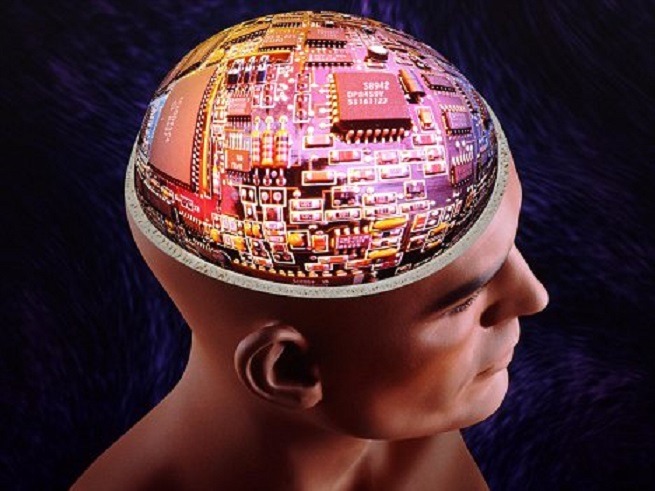[Author]by Jon Rappoport
www.nomorefakenews.com[/Author]
“…one scenario is that the machines will seek to turn humans into cyborgs. This is nearly happening now, replacing faulty limbs with artificial parts.”
“The concern I’m raising is that the machines will view us as an unpredictable and dangerous species.”
“[Machines] might view us the same way we view harmful insects.”
“Del Monte believes machines will become self-conscious and have the capabilities to protect themselves.”
These aren’t quotes from some absurdist satirical play designed to expose human stupidity.
They’re quotes tendered by physicist, Louis Del Monte, the author of The Artificial Intelligence Revolution, from an interview with Dylan Love at Business Insider.
The key to Del Monte’s approach is quote number one: machines might decide to turn humans into cyborgs and it’s already happening in the area of artificial limbs.
What? Excuse me, but humans are deciding to put those limbs on other humans. Machines aren’t.
And even in some hospital of the future, if you had AI androids “making all the surgical decisions,” they wouldn’t actually be choosing anything. They’d be programmed by humans.
Why is this so hard for technocrats to understand? Because they infuse themselves with a mystical vision about artificial intelligence.
They confuse operational capability with consciousness.
Machines “viewing” humans? There is no viewing.
Machines don’t think. They never have, and they never will. They perform according to specs.
They can be programmed to select, from a number of options, the option that fulfills the prime directives humans have given them. And that process of selection is carried out according to patterns originally installed by humans.
There is no mystery here. No mystical leap across a barrier between non-conscious and conscious.
But somewhere up the line, humans can be propagandized to believe machines are alive and have rights.
Technocracy abounds with a titanic amount of sheer bullshit. It’s founded on severe apathy and degrading cynicism about what humans are. So machines become the new gods.
The “cheese-melt” theory of collectivism feeds directly into the worship of machines:
“Individuals are weak and helpless. Therefore, they have to melt down into a collective glob, in order to survive. And from that collective point of view, machines loom up as the most powerful entities in the world. Bow, pray to the Artificial Intelligence.”
Again, humans invented those machines in the first place. But that’s scrubbed from the equation. It’s “old news.” Hardly worth a mention.
God or life or consciousness isn’t going to pop up out of the head of a super-computer in 2045, the designated year for the so-called Singularity—when machine intelligence supposedly outstrips our own.
In 2045, or 2056, or 3000, do you know what’s going to happen? Nothing. Machines will still be machines, doing what they always do. Yes, a mile-wide computer in the desert may be able to perform more operations than a toaster in a motel in Cincinnati, but the level of consciousness in both machines is identical.
In a significant way, the whole machines-will-be-alive business is a smokescreen, utilized to conceal an agenda. That agenda is the overall planning and regulating of global civilization, framed as a problem that needs to be solved.
The specious propaganda (you can find it described and satirized in hundreds of science fiction stories and novels) goes this way:
“If we had, at our fingertips, the total sum of human knowledge, and if we could calculate with it at lightning speed, we’d find the optimum pattern for human society. We’d find the answer to the age-old question: how can we live in peace with each other?”
Sheer nonsense. Such calculations, as always, depend on values and ideals, first principles. All solutions flows from those values.
And machines don’t “discover” values. First principles are prior assumptions made by humans.
People have been arguing and fighting wars over those principles for centuries.
For example: individual freedom vs. ultimate government authority.
A machine is going to “discover” which side of the argument is right? A computer is going to do a billion calculations in 30 seconds and “arrive” at the answer?
That’s on the order of asking an army tank to consult the universe and then tell you whether you should marry the farmer’s daughter or take vows of celibacy as a priest.
These technocrats are merely collectivist wolves in intellectuals’ clothing, who will predispose their machines to ding-ding-ding like Vegas slots on the payoff called Fascism.
(Jon Rappoport is the author of three explosive collections, The Matrix Revealed, Exit From The Matrix, And Power Outside The Matrix).



